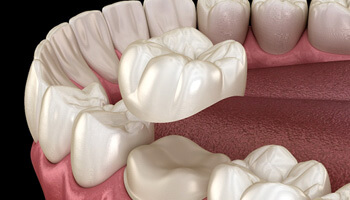Enamel is the strongest substance in your entire body, but it isn’t completely resilient to damage. There are numerous ways that teeth can become damaged. This includes poor dental hygiene, injuries during sports, and unexpected accidents. When you have a tooth that’s been damaged, it becomes vulnerable to additional harm in the future. Fortunately, if you have a tooth that is broken, decayed, or otherwise damaged, you don’t necessarily need to settle for an extraction. At NU Dental of Barnegat,
Dr. Admasu Gizachew
offers customized dental crowns to protect your compromised teeth. To learn more about dental crowns in Barnegat,
give us a call
!
What is a Dental Crown?

Dental crowns are custom-crafted “caps” that are made to fit over the chewing surface of a damaged or weakened tooth above the gumline. This restoration can be made from a variety of different materials, including gold, ceramic, and porcelain. Dental crowns are usually recommended for patients with the following oral health issues:
-
Severe decay that has been repaired with a filling
-
Broken tooth that needs additional support
-
Tooth that has undergone root canal therapy
-
Missing tooth that has been replaced with a dental implant
-
Dental bridge that needs support from the adjacent teeth
-
Tooth that is severely misshapen or discolored
The Process of Getting a Dental Crown

Having a dental crown placed is a relatively straightforward procedure. It can generally be completed in just two appointments. First, Dr. G will examine your smile to ensure that a dental crown is the best restoration option for you. In order to repair your tooth, a thin layer of protective enamel must be removed. This creates room for the crown to fit comfortably in your mouth. An impression is taken and sent to the dental laboratory where your crown will be made. In the meantime, we will provide you with a temporary crown to protect your tooth. It will also help you to get used to how your new crown will feel when it is permanently placed during your next appointment.
The Benefits of Getting a Dental Crown

Dental crowns are able to help patients experience numerous different benefits. Here are just some of the ones you can expect to experience:
-
Improved ability to chew
-
Increased comfort
-
Prevents future dental issues
-
Natural appearance
-
Personalized for each patient
-
Lasts 15+ years with proper maintenance
Understanding the Cost of Dental Crowns

As necessary as getting a crown might be for repairing and protecting your damaged tooth, you should make sure you
have a full picture of what the cost will look like first. Rest assured that our team can answer any questions you
might have about the price tag of your crown, and we can clearly and concisely explain your financial options. Here
are the basics that you need to know when it comes to what you can expect to pay for your restoration.
Read More
Factors That Affect the Cost of Dental Crowns

Not every crown costs exactly the same. The final price can be informed by a number of variables, including:
- The Material Used: Are you planning on getting a gold crown? Or would you prefer one made out
of ceramic or porcelain? The cost of your restoration can vary depending on the material that it’s made
of.
- The Number of Crowns Needed: Obviously, a single crown will cost less than multiple crowns.
Therefore, the number of teeth that need to be repaired can influence the total amount that you pay.
- Additional Treatments: Do you simply need a crown for a tooth that was cracked? Or is the
restoration actually part of another procedure, such as root canal treatment or dental implant placement? Any
related services will factor into the total cost.
When considering your options for dental crowns, don’t assume that the cheapest one is the best one by default.
Cost and quality are often related; the higher cost of a crown made out of quality materials is balanced out by the
fact that you can typically expect the restoration to last longer.
Does Dental Insurance Cover Dental Crowns?

You should always double-check your dental insurance plan to make sure that you’re fully aware of what it will
and will not pay for. Dental crowns are typically covered by insurance as long as they’re considered necessary
for your oral health. Coverage may be around 50%, but this can vary from plan to plan.
Our team regularly works with many different insurance companies, so if you have any questions about your coverage,
we’ll be happy to help. We’ll review the specifics of your plan and let you know how you can use your
benefits to the fullest.
Options for Making Dental Crowns Affordable

Even if you don’t have dental insurance, that doesn’t mean that you can’t potentially save money on
a dental crown. Uninsured patients can sign up for our in-house membership savings plan. We offer a number of tiers
(including Silver, Gold, and Platinum), each of which comes with significant discounts on a variety of services.
If you would like to pay for your dental crown in monthly installments, you can apply for CareCredit financing. One
of the benefits of CareCredit is that it offers a number of payment plans, letting you choose one that suits your
monthly budget.
Dental Crown FAQs
Do Dental Crowns Feel Natural?
Oftentimes, patients are concerned that their dental crown will feel awkward or unnatural. Don’t worry – each one is custom-made just for you, ensuring that it won’t feel obtrusive in any way. In fact, you may be surprised just how natural it feels! We have state-of-the-art impressions, high-quality materials, and secure bonding agents to thank for that.
Are Dental Crowns Permanent?
While dental crowns are designed to last for 15+ years with proper care, they aren’t technically permanent. Once the tooth underneath has been altered, it will always need the protective cap to function properly. The good news is that you can help prolong the lifespan of your dental crown by implementing a solid oral hygiene regimen, including brushing your teeth twice a day, flossing daily, and visiting our Barnegat dentist every six months for a dental checkup and cleaning.
What Happens If You Wait Too Long to Get a Dental Crown?
Waiting too long to get a dental crown can have some detrimental consequences on your oral health and your wallet. For example, if the root of the problem is decay, the infection can continue to delve deeper and deeper into the tooth, increasing your risk of needing a root canal or an extraction. Therefore, it’s always best to schedule the procedure sooner rather than later.
How Do You Know When a Dental Crown Needs to Be Replaced?
As mentioned above, dental crowns are designed to last for well over a decade (with proper care). However, it is important to keep an eye out for the warning signs that it needs to be replaced. Some common ones include:
-
Pain
-
Instability
-
Damage, like a chip or pigmented discoloration
-
A dark line at the base of the crown
Can Dental Crowns Be Whitened?
Unlike your natural teeth, dental crowns aren’t comprised of enamel. As a result, they can’t be whitened. The best way to preserve their white appearance is by implementing a solid oral hygiene regimen, using a straw when you drink dark-colored beverages, and keeping up with your biannual dental cleanings. If you are unhappy with the color of your dental crown as the years go on, then talk to your dentist about your options, like having it replaced.
How Can I Make My Treatment More Affordable?
Even if you don’t have dental insurance, we may be able to help you save money on dental crowns in Barnegat. If you’re worried about your budget, feel free to ask our team about:
- CareCredit – We’re partnered with CareCredit financing, enabling our patients to apply for monthly payment plans at little-to-no interest.
- Our Membership Plan – Like dental insurance, our in-office membership plan provides discounts on our services for an annual premium. Unlike dental insurance, there’s no waiting period, deductible, or annual maximum. Enroll and save the same day!
- Special Offers – We extend periodic special offers, such as our $99 emergency special and a $169 first visit for new patients. Check in to see if you’re eligible!
What Are Dental Crowns Made Of?
At Nu Dental in Barnegat, we can make your dental crown out of gold amalgam, ceramic, or porcelain.
Gold crowns tend to be more durable and cost-effective, but can discolor the tooth underneath and stand out in your smile. If you’re interested in saving some money with a gold amalgam crown, we typically recommend them for back molars that aren’t as visible.
Ceramic and porcelain crowns are very similar. Both are tooth-colored and often favored for their realistic sheen and feel. They’re also both very durable materials – though not quite as durable as gold. Porcelain looks and feels slightly more natural than ceramic and is a bit more stain resistant. Overall, both materials can give your smile a seamless restoration!
How Do You Know When a Dental Crown Needs to Be Replaced?
Unless discoloration and wear and tear are fairly extensive, it can be difficult to tell by just visually looking at your crown. Sometimes patients experience discomfort or instability when it’s time to replace their crown. Otherwise, you’ll likely need the aid of an X-ray or professional exam. Rest assured, at Nu Dental in Barnegat, we’ll investigate your dental work during your biannual checkup and cleaning and report our findings to you!
What’s the Difference Between a Temporary Crown and a Permanent Crown?
During your initial appointment, we’ll make any necessary alterations to your damaged tooth and place a temporary crown overtop of it. Temporary crowns are made from inexpensive materials, so they’re not as durable or lasting as permanent crowns. Their purpose is simply to keep your vulnerable tooth protected until our trusted partners at the dental lab can finish customizing your permanent crown.
This does mean that for one to two weeks, you’ll have to avoid overly hard, crunchy, and chewy foods, and brush and floss your teeth carefully to avoid disturbing the temporary crown. Once your final restoration is placed, you’ll be able to continue with your normal diet and routine!







